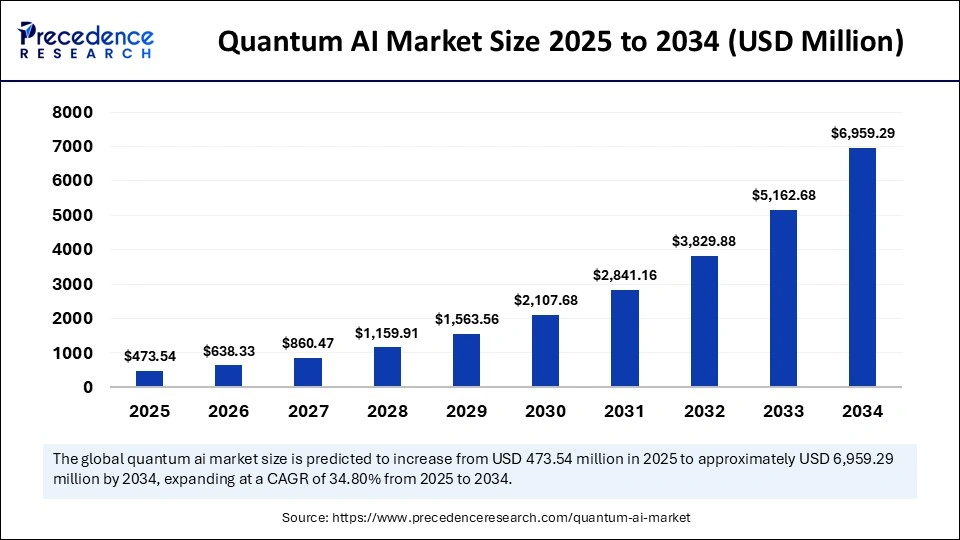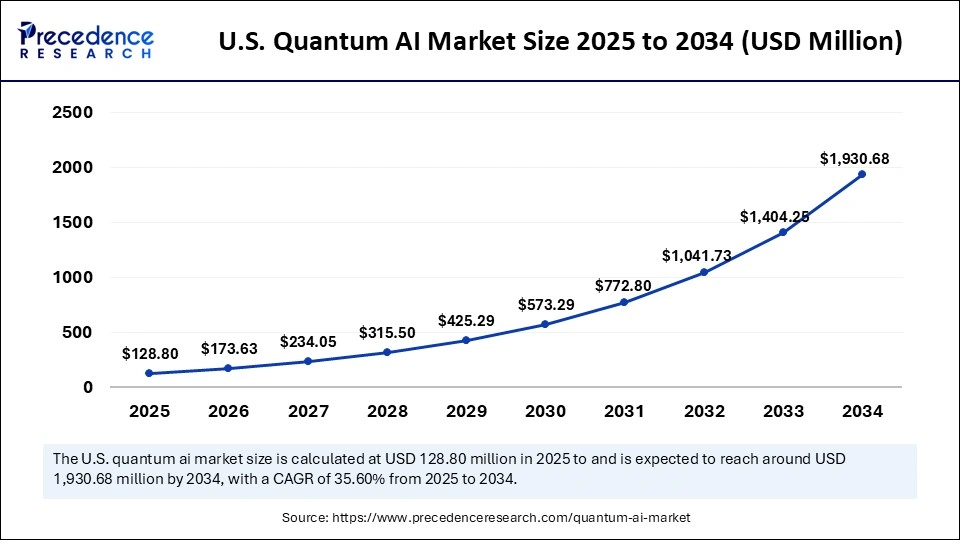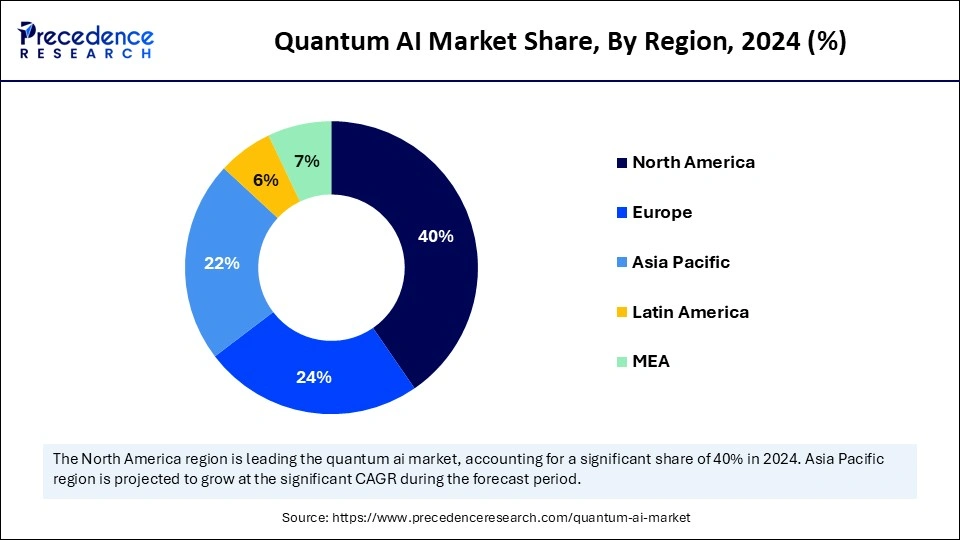Quantum AI Market Size and Forecast 2025 to 2034
The global quantum AI market size accounted for USD 351.29 million in 2024 and is predicted to increase from USD 473.54 million in 2025 to approximately USD 6,959.29 million by 2034, expanding at a CAGR of 34.80% from 2025 to 2034. The growth of the market is attributed to the rising demand for secure AI systems, increasing investment in quantum computing technologies, and the development of new quantum algorithms. Improvements in quantum computing's potential to solve complex problems and the expansion of its applications across various industries further contribute to market growth.

Quantum AI Market Key Takeaways
- In terms of revenue, the quantum AI market is valued at $473.54 million in 2025.
- It is projected to reach $ 6,959.29 million by 2034.
- The market is expected to grow at a CAGR of 34.80% from 2025 to 2034.
- North America dominated the market by holding more than 40% of its market share in 2024.
- Asia Pacific is expected to grow at a notable CAGR of 37.8% during the forecast period.
- By component, the hardware segment held the biggest market share of 40% in 2024.
- By component, the software segment is expected to witness the fastest growth during the predicted timeframe.
- By deployment mode, the on-premises segment dominated the market with the highest share in 2024.
- By deployment mode, the cloud-based segment is expected to grow at the fastest rate during the forecast period.
- By application, the machine learning & optimization segment captured the largest share of the market in 2024.
- By application, the quantum security & cryptography segment is seen to grow at a significant rate in the upcoming period.
How is AI beneficial for Quantum Computing?
Artificial intelligence is transforming the quantum computing field, enabling the development and optimization of quantum algorithms. AI can enhance the reliability of quantum systems, reducing errors and fine-tuning their performance. Additionally, it can boost the power of quantum computing to supercharge AI by providing innovative ways to train models and tackle complex problems. AI helps quantum computing by optimizing algorithms, further improving quantum computers' efficiency.
U.S. Quantum AI Market Size and Growth 2025 to 2034
The U.S. quantum AI market size was exhibited at USD 95.55 million in 2024 and is projected to be worth around USD 1,930.68 million by 2034, growing at a CAGR of 35.06% from 2025 to 2034.

North America led the quantum AI market with the largest share in 2024. This is mainly due to its robust technological infrastructure, significant investments in research and development, and a thriving AI field, with leading companies like IBM, SandboxAQ, Rigetti, and Google collaborating to bring innovations to quantum AI. The dominance of the region is also driven by successful collaborations between academic institutions, research labs, and industry players to drive innovations and breakthroughs. Furthermore, government initiatives like the U.S. National Quantum Initiative Act and other initiatives reinforce quantum computing research, creating a favorable environment for the growth of the quantum AI market.
- In January 2024, SandboxAQ acquired Good Chemistry, a leading computational chemistry company. This strategic acquisition led to AI innovations with Large Quantitative Models (LQMs), poised to influence industries such as biopharma, specialty chemicals, energy, and others that benefit from advanced materials science.
The U.S. plays a major role in the North American quantum AI market due to its robust investments and technological advancements, together with well-established technological infrastructure and strong government support. The presence of major tech companies like IBM, Google, and Microsoft further supports market growth. The U.S. leads in research and development, with significant government investments. The U.S. is at the forefront of technological innovations, attracting talent and enabling the commercialization of quantum AI across various industries.

Asia Pacific is observed to be the fastest-growing region during the forecast period, because of increasing investment in quantum research, government initiatives to promote quantum technologies, and the growing adoption of quantum computing in industries like financial. Many countries in the region, like China, India, Japan, and South Korea, are actively supporting quantum research and development through government funding. For instance, the National Quantum Mission of India is a significant initiative to propel the leadership of the country in quantum technology. The significant pool of skilled engineers and scientists in the region is pivotal for developing and deploying quantum AI solutions and strategies to expand market growth.
- In April 2025, IonQ signed an MoU with Japan's G-QuAT, a division of AIST, to collaborate on advancing quantum computing technologies in Japan.
- In August 2024, Quantum AI Global collaborated with Q-CTRL, aiming to advance quantum education and support the National Quantum Mission of India.
China plays a crucial role in the quantum AI market because China emphasizes quantum technology as a strategic tool for national security and global competitiveness. India is poised to grow at the fastest rate in the market, owing to its strong emphasis on AI to address domestic societal challenges in areas like healthcare to diagnose early diseases and improve healthcare access. The National Quantum Mission initiative by the government aims to fill the gap in quantum technology and enable its use for business, governance, and research.
Europe is considered to be a significantly growing area. The growth of the quantum AI market in Europe can be driven by its increased investments in quantum research, a dynamic industrial ecosystem, and an increasing emphasis on AI innovation. The Quantum Flagship program of the European Union and initiatives like EuroHPC JU illustrate a commitment to building a quantum ecosystem and fostering collaboration. An increasing number of European companies are investing heavily in developing quantum technologies. Furthermore, the European Commission and individual member states are investing heavily in quantum technology, supporting the regional market growth.
Market Overview
The quantum AI market encompasses the intersection of quantum computing and artificial intelligence, where quantum technologies are exploited to improve AI capabilities. This market comprises developing and applying quantum algorithms, hardware, and software to solve complex problems and process data more efficiently than traditional methods. Quantum AI is applicable in areas such as drug discovery, optimization, financial odelling, and material science. Quantum AI can optimize complex systems and improve decision-making. Quantum AI is being investigated for its ability to enhance cybersecurity by improving encryption and threat detection, potentially reducing the risk of data breaches.
Quantum AI Market Growth Factors
- Advancements in Quantum Computing and AI: Ongoing innovations in developing more stable and powerful quantum processors, along with advancements in qubit technology and new algorithms that exploit quantum mechanics and AI to perform complex problems by enabling faster processing speeds with improved accuracy in simulations and the ability to handle massive datasets.
- Higher Demand for Quantum-Safe AI Security Solutions: The growth of quantum computing poses a threat to current encryption methods, resulting in an increasing demand for quantum-safe AI security solutions due to the increasing complexity and size of data sets requiring faster processing speeds offered by Quantum AI.
- Expanding Applications of Quantum AI: Quantum AI can hasten drug discovery by simulating complex molecular interactions, progressively leading to faster development of new treatments. It helps in risk management and fraud detection in the finance sector. It also aids in the design and discovery of new materials by simulating their properties at the atomic level.
Market Scope
| Report Coverage | Details |
| Market Size by 2034 | USD 6,959.29 Million |
| Market Size in 2025 | USD 473.54 Million |
| Market Size in 2024 | USD 351.29 Million |
| Market Growth Rate from 2025 to 2034 | CAGR of 34.80% |
| Dominating Region | North America |
| Fastest Growing Region | Asia Pacific |
| Base Year | 2024 |
| Forecast Period | 2025 to 2034 |
| Segments Covered | Component, Deployment Mode, Application, and Regions |
| Regions Covered |
North America, Europe, Asia-Pacific, Latin America, and Middle East & Africa |
Market Dynamics
Drivers
Increasing Demand for Advanced Security Measures
The primary driver of the quantum AI market is the increasing demand for advanced security measures. This is spurred by faster and more powerful AI solutions and the potential of quantum computing to solve complex problems that are intractable for classical computers, and the emerging threat of quantum computers breaking current encryption methods. Furthermore, the integration of quantum computing with cloud services also enhances processing capabilities and democratizes access to avoid breaches.
Restraint
Higher Initial Costs and Technical Complexities
The higher initial cost of quantum computers is a key factor restraining the growth of the quantum AI market. Developing quantum computers requires substantial investments in hardware and software, making it difficult for many organizations and researchers to access and leverage quantum AI solutions. Efforts are underway to develop software and algorithms that are specifically designed to work with quantum hardware, making it easier and less expensive to use quantum AI. Moreover, quantum computing technology is still in its early stages, creating complexities in scaling up quantum systems. Major key players like IBM and Google are investing heavily in quantum AI, but the higher initial costs and technical complexities continue to be a major hurdle for broader adoption.
Opportunity
Development of Advanced Quantum Algorithms
The key future opportunity in the quantum AI market lies in the development of advanced quantum algorithms. These algorithms can accelerate drug discovery and improve material science. This is due to quantum computers being able to simulate complex molecular interactions and material properties much faster and more accurately than classical computers, progressively leading to breakthroughs in finding novel drugs and materials with specific characteristics.
- In February 2025, the Generative Quantum AI framework (Gen QAI) of Quantum generated data by its powerful H2 Quantum computer, which can be harnessed to train AI systems. This system is projected to be a trillion times more powerful than its H2 system, opening up new possibilities for research and development in these areas.
Component Insights
The hardware segment held a dominant share of the quantum AI market in 2024. This is because it represents the fundamental physical infrastructure required for quantum computing, comprising processors, qubits, and supporting systems. Hardware is essential for running quantum algorithms and solving complex problems that are too complicated for classical computers. Advancements in quantum hardware, such as improved qubit performance and coherence time, result in breakthroughs in quantum algorithms and applications. The higher need for powerful and scalable hardware becomes paramount, bolstering the growth of the segment.
- In November 2024, NVIDIA announced its collaboration with Google Quantum AI to advance the design of quantum processors through large-scale simulations on the NVIDIA CUDA-Q platform. Using NVIDIA Eos supercomputers powered by 1,024 H100 Tensor Core GPUs, Google Quantum AI simulates quantum device physics to address hardware constraints and noise in quantum operations.
The software segment is expected to witness the fastest growth during the predicted timeframe. The growth of the segment is attributed to the rising demand for software solutions that can effectively leverage quantum hardware and algorithms. The software segment provides the tools and frameworks required for developing, executing, and optimizing quantum algorithms. As quantum computing technology advances, the need for software that can handle the complex data and computations involved in quantum AI applications also increases.
- In March 2024, ID Quantique launched an intelligent Quantum Key exchange software platform, which enables seamless futureproofing of the network security for enterprises, while enabling telco operators to provide new quantum-safe services that facilitate long-term security of data in transit for their valued B-to-B customers and users.
Deployment Mode insights
The on-premises segment dominated the quantum AI market with the highest share in 2024. This is mainly due to its superior control, security, and customization capabilities, providing businesses with complete control over their infrastructure. On-premises deployment allows for tailored solutions that meet specific demands and operational requirements. On-premises deployment not only provides control over data storage and processing but also addresses concerns about data privacy and security by implementing robust security measures and ensuring compliance with industry regulations.
The cloud-based segment is expected to grow at the fastest rate during the forecast period. This is mainly due to its flexibility, scalability, and accessibility, enabling organizations to leverage quantum computing capabilities without significant investment in hardware. Cloud-based quantum computing services help with the efficient implementation of AI and ML workloads and lower the complexity and cost of deploying quantum solutions by making quantum AI technologies more convenient to large as well as small & medium-sized organizations.
Application Insights
The machine learning & optimization segment captured the largest share of the quantum AI market in 2024, due to its ability to significantly improve decision-making and operational efficiency across multiple sectors. Machine learning & optimization leverages the power of quantum computing to examine and evaluate large datasets, find patterns, and make predictions more efficiently than traditional methods. Thus, the combination of quantum computing and machine learning leads to the potential to revolutionize industries like finance, healthcare, and manufacturing with informed business strategies and improved customer experiences, along with streamlined operations by making it a core area of focus.
The quantum security & cryptography segment is seen to grow at the fastest rate in the upcoming years due to the increasing vulnerability of traditional encryption methods to quantum attacks. The rising demand for robust security solutions in different industries like government, finance, and defense further drives segmental growth. The segment's growth is further driven by the rising development of quantum key distribution and other quantum-resistant cryptography techniques, which provide secure communication and data protection for exchanging and protecting sensitive information.
Quantum AI Market Companies

- Amazon Web Services
- D-Wave Quantum Inc.
- Fujitsu
- Google LLC
- Hitachi, Ltd.
- IBM Corporation
- Intel Corporation
- Microsoft
- SandboxAQ
- Toshiba Corporation
Latest Announcement by Industry Leaders
- In September 2024, Compulink Healthcare Solutions announced a strategic partnership with Quantum AI Health to deliver a groundbreaking AI-powered Ambient Medical Scribe. Link Wilson, Founder and CEO at Compulink, said, “This partnership marks a significant advancement in the healthcare industry, offering providers another powerful tool option to streamline their workflows and deliver exceptional patient care. This solution aligns perfectly with our commitment to providing our clients with the latest technology so providers can choose what works best for them and their practice to increase the efficiency of their practice.”
- In February 2024, Google Cloud collaborated with SandboxAQ, a quantum computing startup, to integrate large quantum-based models into Google Cloud. Jack D. Hidary, CEO of SandboxAQ, said, "Partnering with Google Cloud enables us to deliver enhanced value to customers by leveraging their industry-leading cloud computing and AI infrastructure with our groundbreaking Large Quantitative Models (LQMs). This collaboration accelerates our efforts to develop Quantitative AI technologies and applications that address critical challenges, such as breakthroughs in Alzheimer's research and other key areas of biopharma work.”
Recent Developments
- In April 2025, Terra Quantum launched its closed beta of TQ42 Studio, a new ecosystem for hybrid quantum-classical AI development, inaugurating QAI Hub (a no-code quantum ML platform) and Qode Engine (a Python SDK) to reinforce hybrid quantum-classical AI development.
- In February 2025, Quantinuum announced a groundbreaking Generative Quantum AI framework (Gen QAI) by utilizing unique quantum-generated data to enable commercial applications in areas ranging from the development of new medicines, precise predictive modeling of financial markets and real-time optimization of global logistics and supply chains by solving the complex problems that classical computing cannot address.
Segments Covered in the Report
By Component
- Hardware
- Software
- Services
By Deployment Mode
- On-premises
- Cloud-based
By Application
- Machine Learning & Optimization
- Quantum Security & Cryptography
- Simulation & Modeling
- Others
By Region
- North America
- Europe
- Asia Pacific
- Latin America
- Middle East & Africa
For inquiries regarding discounts, bulk purchases, or customization requests, please contact us at sales@precedenceresearch.com
Frequently Asked Questions
Ask For Sample
No cookie-cutter, only authentic analysis – take the 1st step to become a Precedence Research client
 Get a Sample
Get a Sample
 Table Of Content
Table Of Content
 sales@precedenceresearch.com
sales@precedenceresearch.com
 +1 804-441-9344
+1 804-441-9344
 Schedule a Meeting
Schedule a Meeting